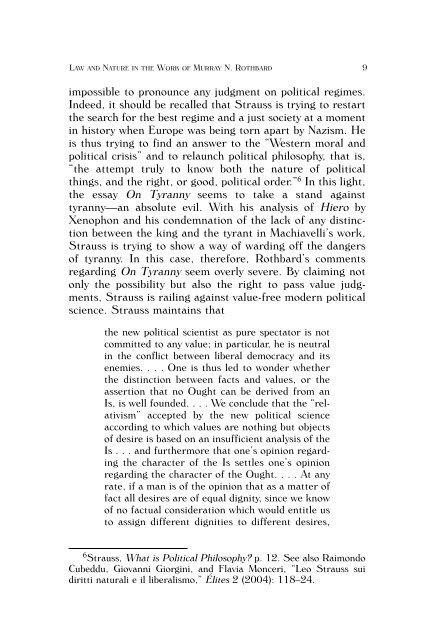Murray N. Rothbard vs. the Philosophers - Ludwig von Mises Institute
Murray N. Rothbard vs. the Philosophers - Ludwig von Mises Institute
Murray N. Rothbard vs. the Philosophers - Ludwig von Mises Institute
Create successful ePaper yourself
Turn your PDF publications into a flip-book with our unique Google optimized e-Paper software.
LAW AND NATURE IN THE WORK OF MURRAY N. ROTHBARD 9<br />
impossible to pronounce any judgment on political regimes.<br />
Indeed, it should be recalled that Strauss is trying to restart<br />
<strong>the</strong> search for <strong>the</strong> best regime and a just society at a moment<br />
in history when Europe was being torn apart by Nazism. He<br />
is thus trying to find an answer to <strong>the</strong> “Western moral and<br />
political crisis” and to relaunch political philosophy, that is,<br />
“<strong>the</strong> attempt truly to know both <strong>the</strong> nature of political<br />
things, and <strong>the</strong> right, or good, political order.” 6 In this light,<br />
<strong>the</strong> essay On Tyranny seems to take a stand against<br />
tyranny—an absolute evil. With his analysis of Hiero by<br />
Xenophon and his condemnation of <strong>the</strong> lack of any distinction<br />
between <strong>the</strong> king and <strong>the</strong> tyrant in Machiavelli’s work,<br />
Strauss is trying to show a way of warding off <strong>the</strong> dangers<br />
of tyranny. In this case, <strong>the</strong>refore, <strong>Rothbard</strong>’s comments<br />
regarding On Tyranny seem overly severe. By claiming not<br />
only <strong>the</strong> possibility but also <strong>the</strong> right to pass value judgments,<br />
Strauss is railing against value-free modern political<br />
science. Strauss maintains that<br />
<strong>the</strong> new political scientist as pure spectator is not<br />
committed to any value; in particular, he is neutral<br />
in <strong>the</strong> conflict between liberal democracy and its<br />
enemies. . . . One is thus led to wonder whe<strong>the</strong>r<br />
<strong>the</strong> distinction between facts and values, or <strong>the</strong><br />
assertion that no Ought can be derived from an<br />
Is, is well founded. . . . We conclude that <strong>the</strong> “relativism”<br />
accepted by <strong>the</strong> new political science<br />
according to which values are nothing but objects<br />
of desire is based on an insufficient analysis of <strong>the</strong><br />
Is . . . and fur<strong>the</strong>rmore that one’s opinion regarding<br />
<strong>the</strong> character of <strong>the</strong> Is settles one’s opinion<br />
regarding <strong>the</strong> character of <strong>the</strong> Ought. . . . At any<br />
rate, if a man is of <strong>the</strong> opinion that as a matter of<br />
fact all desires are of equal dignity, since we know<br />
of no factual consideration which would entitle us<br />
to assign different dignities to different desires,<br />
6 Strauss, What is Political Philosophy? p. 12. See also Raimondo<br />
Cubeddu, Giovanni Giorgini, and Flavia Monceri, “Leo Strauss sui<br />
diritti naturali e il liberalismo,” Élites 2 (2004): 118–24.


